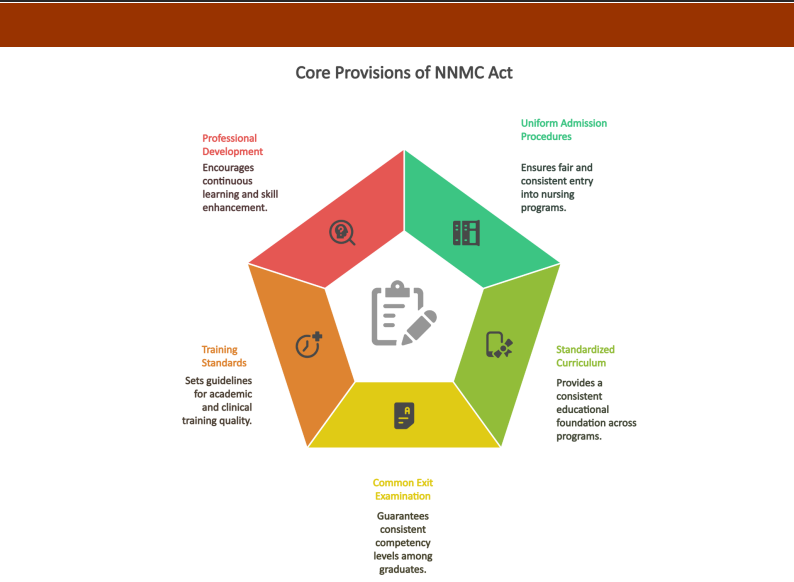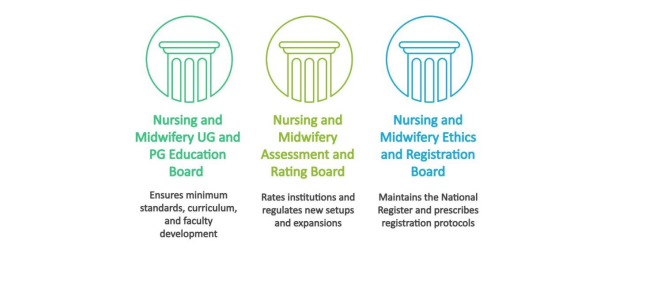Uttar Pradesh's Journey towards Excellence in Nursing: Aligning with the National Nursing and Midwifery Commission Act, 2023
Introduction :
India’s commitment to achieve Universal Health Coverage depends significantly on building a robust, ethically grounded and professionally capable nursing and midwifery workforce. In this context, the National Nursing and Midwifery Commission (NNMC) Act, 2023 emerges as a transformative legislation that provides a comprehensive and structured approach to regulating nursing and midwifery education, registration, ethics and practice. The Act introduces a modern, multi-tiered and accountable governance system through its dedicated boards, designed to ensure quality assurance, transparency and consistency across the profession. This document outlines how Uttar Pradesh is aligning with the NNMC Act’s framework, demonstrating early adoption of its core principles and offering a scalable model for effective implementation at the state level.
Overview of the NNMC Act, 2023 :
The enactment of the NNMC Act, 2023 marks a significant advancement in the regulation of nursing and midwifery in India. Replacing the Indian Nursing Council Act of 1947, the NNMC Act introduces a decentralized regulatory structure with autonomous national and state-level boards to enhance quality, transparency and accountability.
Key Features :
Regulatory Structure
- Shifts from a single centralized council (INC) to decentralized with National and State Registers under NNMC
- Establishes three distinct autonomous boards with specific functions related education, assessment, ethics, and registration
Nationwide Standardization
- Promotes uniform standards for nursing and midwifery education and practice throughout India
- Aligns regulatory oversight with current healthcare requirements
Defined Roles and Enhanced Accountability
- Clearly defines the functions of the Commission and its boards to ensure transparency
- Accountability and transparency enhanced through regular audits and grievance redressal

Creation of Autonomous Boards :
The NNMC Act establishes three autonomous boards within the National Nursing and Midwifery Commission, each entrusted with specific functions to ensure focused and effective regulation.

Uttar Pradesh’s Progress Towards Alignment with the NNMC Act, 2023 :
Uttar Pradesh has undertaken significant steps toward aligning with the key provisions of the NNMC Act, 2023, particularly in the domains of education reform, institutional strengthening, and regulatory mechanism.
Standardization of Admissions and Curriculum Implementation
- For the academic year 2025-26, centralized admissions for the GNM Diploma course will be conducted through a competitive entrance examination – UPGET (Uttar Pradesh GNM Entrance Test), administered by Atal Bihari Vajpayee Medical University, Uttar Pradesh. This process will apply to both private (19190 seats in 407 institutes) and government (453 seats in 9 institutes) GNM training institutes, ensuring a merit-based, transparent, and uniform selection system across the state.
- Efforts are underway to align nursing curriculum with competency-based education.
Institutional Quality Assurance and Regulation
- Nursing institutes are geo-tagged via the 'Institag' application, transitioning data to digital and aiding equitable expansion.
- The affiliation process has been streamlined via third-party assessments with online applications and live monitoring mechanisms.
- A statewide quality rating system has been institutionalized evaluating infrastructure, teaching-learning processes, and learning outcomes.
Competency-Based Digital Learning
- Faculty development is supported through Continuing Nursing Professional Development (CNPD) initiatives, virtual trainings, and credit- based certifications.
- To promote competency-based learning, UPSMF developed procedure-based nursing training videos in Hindi, aligned with OSCE checklists for uniform skill development.
- A state-wide webinar on Principles of Teaching in Nursing Education was organized by UPSMF in April 2023, to strengthen faculty capability in competency-based education.
Institutional Strengthening and System Reforms
- UP State Medical Faculty (UPSMF) is undergoing capacity enhancements, including formation of advisory and technical groups.
- A structured Mentor-Mentee Program is operational to uplift underperforming institutions through peer-to-peer support and technical guidance.
- Efforts are in progress to synchronize the state nurse registry with the Nurses Registration and Tracking System (NRTS).
Potential scope of work as per NNMC :
- A skill-based examination to ensure adequate competence of Nursing and Midwifery professionals before enrolment in the State Register
- Uniformity in adoption of standardized curriculum across all public and private institutions
- Issue certification of specialization or other forms of certification to those who practice the profession of nursing and midwifery
- Mechanisms for disciplinary action, compliance enforcement, and recognition of withdrawal need to be formalized in line with the Act’s provisions for non-compliant institutes
- E-Kshamata, a digital LMS, is to be rolled out that supports standardized, self-paced learning with access to standard curriculum-aligned resources
Conclusion :
TUttar Pradesh has emerged as a front runner in translating the NNMC Act’s legislative vision into systemic reform by standardizing admissions, enhancing curricula, establishing regulatory mechanisms, and promoting continuous faculty and institutional development. These strategic actions improve the quality of nursing education and practice while strengthening the national healthcare system. Uttar Pradesh’s proactive approach provides a replicable model for other states, demonstrating how timely reforms and collaborative governance can build a resilient, future-ready nursing workforce.





